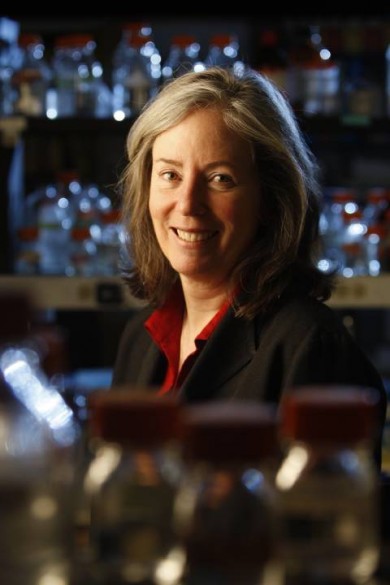
Ellen Fanning, Stevenson Professor of Biological Sciences and a professor of the Howard Hughes Medical Institute, died on Sunday morning, Sept.1, after a lengthy battle with amyotrophic lateral sclerosis (ALS). She was 67 years old.
“Ellen Fanning was a valued colleague and a dear friend and her death is a great loss for all who knew her. Of her many accomplishments and awards, I think the one for which she was most proud was the Howard Hughes Undergraduate Research Program that she directed,” Provost Richard McCarty said. “She worked tirelessly on behalf of her students, and the structure of her program was replicated at other colleges and universities across the country. Her leadership on campus will be sorely missed.”
Fanning joined the Vanderbilt faculty in 1995. In 2002, she was one of 20 research scientists nationwide to receive $1 million over the following four years from the Howard Hughes Medical Institute as part of an initiative intended to encourage researchers to put as much creativity into undergraduate education as they did into research. She used the funds to build what she called a “Community of Scholars” to give participating Vanderbilt undergraduates hands-on research experience. Many of her former undergraduate and graduate students went on to careers in science and medicine.
“Ellen Fanning was among the most distinguished scientists among faculty in the College of Arts and Science. She was also a deeply dedicated mentor to undergraduate and graduate students and younger faculty,” Carolyn Dever, dean of the College of Arts and Science and professor of English, said. “She was a great person and a true pioneer. This is a huge loss for Vanderbilt and for the scientific community.”
Fanning received her Ph.D. in 1977 from the University of Cologne in Cologne, Germany. She held faculty positions at the University of Konstanz and the University of Munich in Germany before coming to Vanderbilt.
Fanning’s research focused on DNA replication in mammalian cells. Control of DNA replication is one of the key processes in the regulation of the mammalian cell cycle. Misregulation of the cell cycle can arise at several stages and is an important causative factor in a variety of human diseases, the most frequent being cancer. The long-term goal of her laboratory’s research is to understand in molecular detail the mechanisms that control DNA replication in mammalian cells.
“The faculty of the Department of Biological Sciences and I join Ellen’s many colleagues and friends throughout the university in our shared sadness over her death,” said Charles Singleton, chair and professor of biological sciences. “Ellen’s many contributions in teaching, in research and in service were invaluable to our department and to Vanderbilt. The many local, national and international awards and honors bestowed on Ellen testify to her stature in the academic community and reflect her numerous scientific contributions to the field of genome replication and maintenance. I know I speak for her students and our faculty in saying that we will all miss Ellen both personally and professionally.”
Fanning she served as chair of the Department of Molecular Biology from 1999 to 2002. She was the recipient of the Chancellor’s Cup in 2005 and a Chancellor’s Award for Research in 2006. While a professor in Germany, Fanning was elected in 1995 to membership in the European Molecular Biology Organization. In 2007 Fanning was elected as a member of the American Association for the Advancement of Sciences and to the German Academy of Sciences Leopoldina, the oldest German-speaking society of scholars, for her scientific achievements and her personal standing.
In 2008, Fanning was the recipient of the Alexander von Humboldt-Forschungspreis, Germany’s highest research award for senior U.S. scientists and scholars, and in 2010 she was elected as a fellow in the American Academy of Microbiology, an honorific leadership group within the American Society for Microbiology, the world’s oldest and largest life science organization.
Fanning served on several study sections at the National Institutes of Health and on several editorial boards, most recently for the Journal of Biological Chemistry. Among the many advisory committees on which she has served, Fanning was especially proud to serve with the Shaw Scientist Advisory Board of the Greater Milwaukee Foundation that oversees awards supporting young scientists performing groundbreaking genetics and cancer research.
Fanning is survived by her husband, Stephen E. Pryor, and extended family members. The family asks that donations in memory or in honor of Fanning be made to the ALS Association.